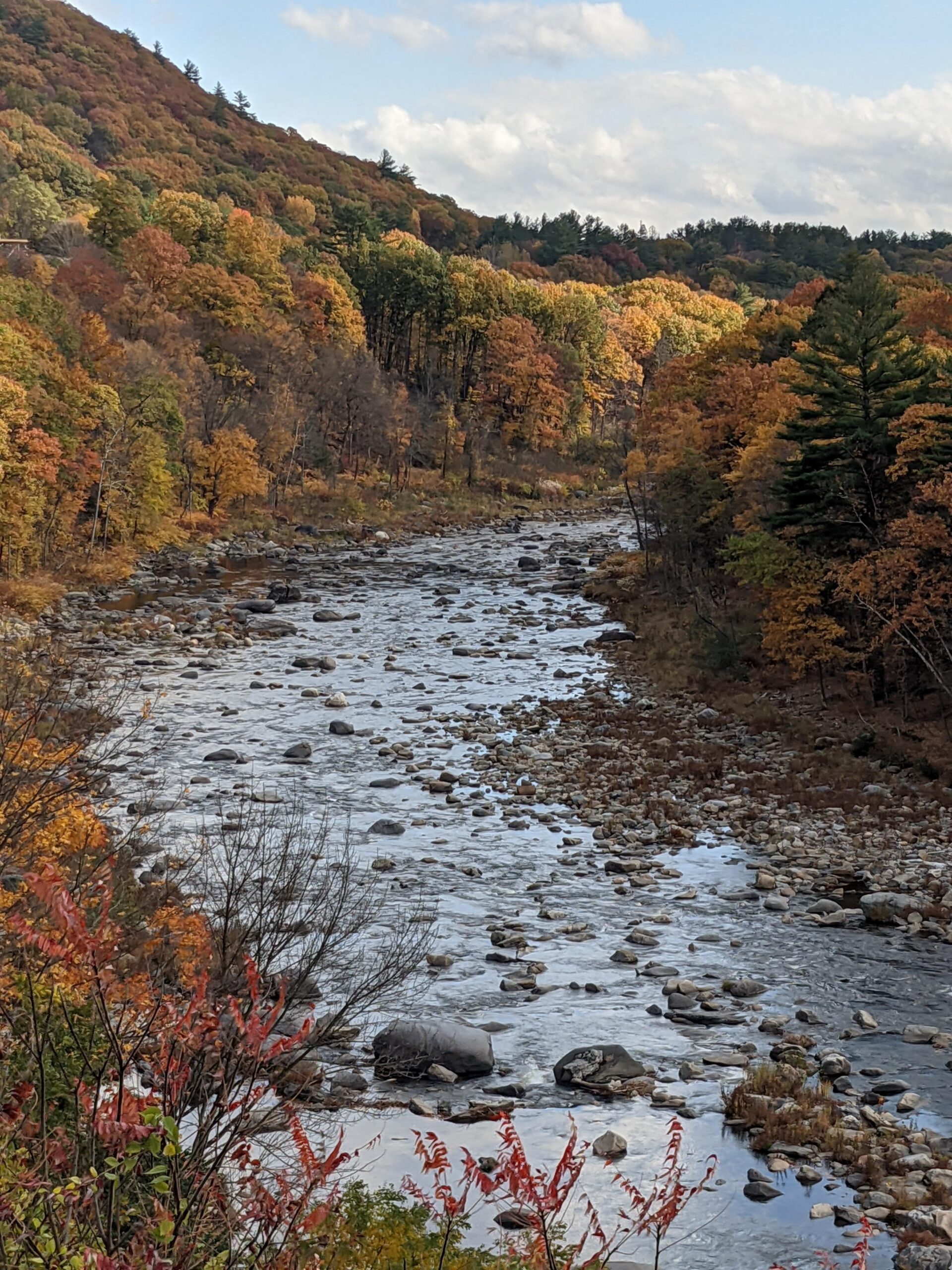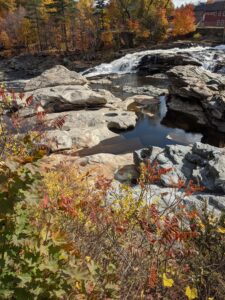 How the Shelburne Falls Community Orchard Came About
How the Shelburne Falls Community Orchard Came About
The Shelburne Falls Community Orchard is situated on roughly a one-half acre of land overlooking the Deerfield River in the village of Shelburne Falls, MA. The town is located in the eastern foothills of the Berkshires along the ancient Mohawk-Mohican Trail in western Franklin County, at the picturesque waterfalls that mark confluence of traditional Mohawk, Pocumtuck, and Algonquin territories. A treaty signed in 1708 served to preserve in perpetual peace the area within one day’s journey from the waterfall for access to shared hunting and fishing in the river at the falls.
In this spirit of shared natural resources, the idea for both a Shelburne Falls Community Garden and a Shelburne Falls Community Orchard grew out of a desire to address food insecurity in the region, as well as unequal access to land and growing space. Planning began with a basic understanding of permaculture and regenerative design and a goal of simultaneously growing both food and community relationships in the widest sense: relationships among all neighbors including human, animals, insects, and plants.
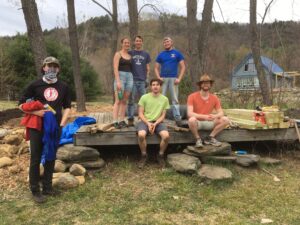 In the spring of 2019 the Salmon Falls Land Association (SFLA) , a small co-housing community in the village, agreed to allocate a portion of its jointly owned land for the establishment of a Shelburne Falls Community Garden and a Shelburne Falls Community Orchard. In the fall of 2019, utilizing a small grant from the New England Grassroots Fund Seed Grant program, the Shelburne Falls Community Garden constructed a garden fence for the establishment of a 45ʹ x 70ʹ community garden with eight individual plots designated for people in the area who had no access to growing space. Around that same time, funded by a modest private donation, the Shelburne Falls Community Orchard Project ordered its first fruit trees in the fall of 2019, to be planted in the spring of 2020. By spring of 2020 the Shelburne Falls Community Garden was functioning, providing a sliding scale fee ($0-$50) for a plot during the growing season.
In the spring of 2019 the Salmon Falls Land Association (SFLA) , a small co-housing community in the village, agreed to allocate a portion of its jointly owned land for the establishment of a Shelburne Falls Community Garden and a Shelburne Falls Community Orchard. In the fall of 2019, utilizing a small grant from the New England Grassroots Fund Seed Grant program, the Shelburne Falls Community Garden constructed a garden fence for the establishment of a 45ʹ x 70ʹ community garden with eight individual plots designated for people in the area who had no access to growing space. Around that same time, funded by a modest private donation, the Shelburne Falls Community Orchard Project ordered its first fruit trees in the fall of 2019, to be planted in the spring of 2020. By spring of 2020 the Shelburne Falls Community Garden was functioning, providing a sliding scale fee ($0-$50) for a plot during the growing season.
Through the fall 2019 and winter 2020, a small group of friends and neighbors initially calling themselves “The Neighborhood Prosperity Project” (including members of the Shelburne Falls Community Orchard Project) began monthly conversations considering the Shelburne Falls portion of the Deerfield River Valley as a whole. The group hoped to identify parcels of land with open growing space that might be made available to anyone in need, wanting to develop a more resilient and self-sufficient economy. Land access for all was a primary dream, with the hope to identify land best suited for growing certain crops, and then to pair farmers, orchardists, and individuals wanting to ‘get their hands in the dirt’ with whichever land parcels were available. These conversations evoked creative conversations to try to understand issues of food insecurity, racial disparities, and the growing threats to wildlife and pollinators in the area.
The Neighborhood Prosperity Project identified both Frog Song Farm (Conway, MA) and the land on which the Shelburne Falls Community Orchard and Shelburne Falls Community Garden were situated (Buckland, MA) as initial possible locations for immediate access to individuals seeking growing space. The Shelburne Falls Community Orchard had already begun taking steps toward its goal of providing 100% of its eventual harvest for those in need of food, and the Shelburne Falls Community Garden was already in operation. Leaping Frog Farm began construction of 2 hoop tunnels for a CSA winter gardening project, and access to field space during the summer months. In response to interest, Frog Song Farm also launched a small but successful maple sugaring education project during the winter, followed by seasonal theater performances that used poetry, dance, song and silence to connect to the land.
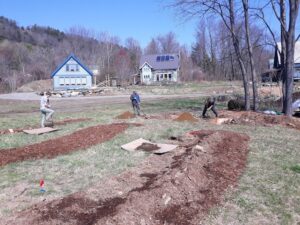 In the spring of 2020, coinciding with the onset of the COVID-19 pandemic, masked and socially distanced volunteers planted the first 25 fruit trees at the Shelburne Falls Community Orchard, which included a diverse mix of varieties of apple, pear, plum, and peach trees, interspersed with nitrogen fixers. These first trees thrived, though sadly, on the day they were planted the mother of one of the orchard founders succumbed to COVID-19. The Community Orchard dedicated its Reliance peach tree, in remembrance of Delores Consolo, with the hope of using the Reliance peach harvest to make and distribute her famous peach tart.
In the spring of 2020, coinciding with the onset of the COVID-19 pandemic, masked and socially distanced volunteers planted the first 25 fruit trees at the Shelburne Falls Community Orchard, which included a diverse mix of varieties of apple, pear, plum, and peach trees, interspersed with nitrogen fixers. These first trees thrived, though sadly, on the day they were planted the mother of one of the orchard founders succumbed to COVID-19. The Community Orchard dedicated its Reliance peach tree, in remembrance of Delores Consolo, with the hope of using the Reliance peach harvest to make and distribute her famous peach tart.
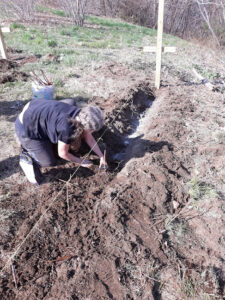 By the fall of 2020 volunteers – now considered members of the orchard “guild” – added over 50 native shrubs and berry bushes, and throughout 2021 growing season established an understory layer of over 70 types of herbaceous plants selected for pollinator support, medicinal properties, and culinary possibilities. Plantings were arranged alternating varieties, to maximize pest resistance, and according to permaculture design principles to move towards a “food forest” or “forest garden” in the years to come.
By the fall of 2020 volunteers – now considered members of the orchard “guild” – added over 50 native shrubs and berry bushes, and throughout 2021 growing season established an understory layer of over 70 types of herbaceous plants selected for pollinator support, medicinal properties, and culinary possibilities. Plantings were arranged alternating varieties, to maximize pest resistance, and according to permaculture design principles to move towards a “food forest” or “forest garden” in the years to come.
An Open House in October 2020 officially launched The Shelburne Falls Community Orchard to the public, with local musicians playing throughout the day and tours of the orchard provided. Throughout the winter of 2021-2022 guild members have been working to design the processes of outreach and website design, to prepare plantings for the next growing season, and to fill the calendar with community workshops, workdays, and gatherings.
The Shelburne Falls Community Orchard Going Forward
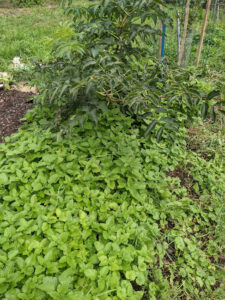
Though modest in scale, the orchard harvest hopes to make a small dent in food insecurity facing local neighbors. Its longer term value lies in its capacity, along with other similar projects, to generate a new network of mutual caring aimed at overcoming socioeconomic, generational, and cultural barriers, extending out into the community in unforeseen ways, to bring more life and vibrancy to all.
